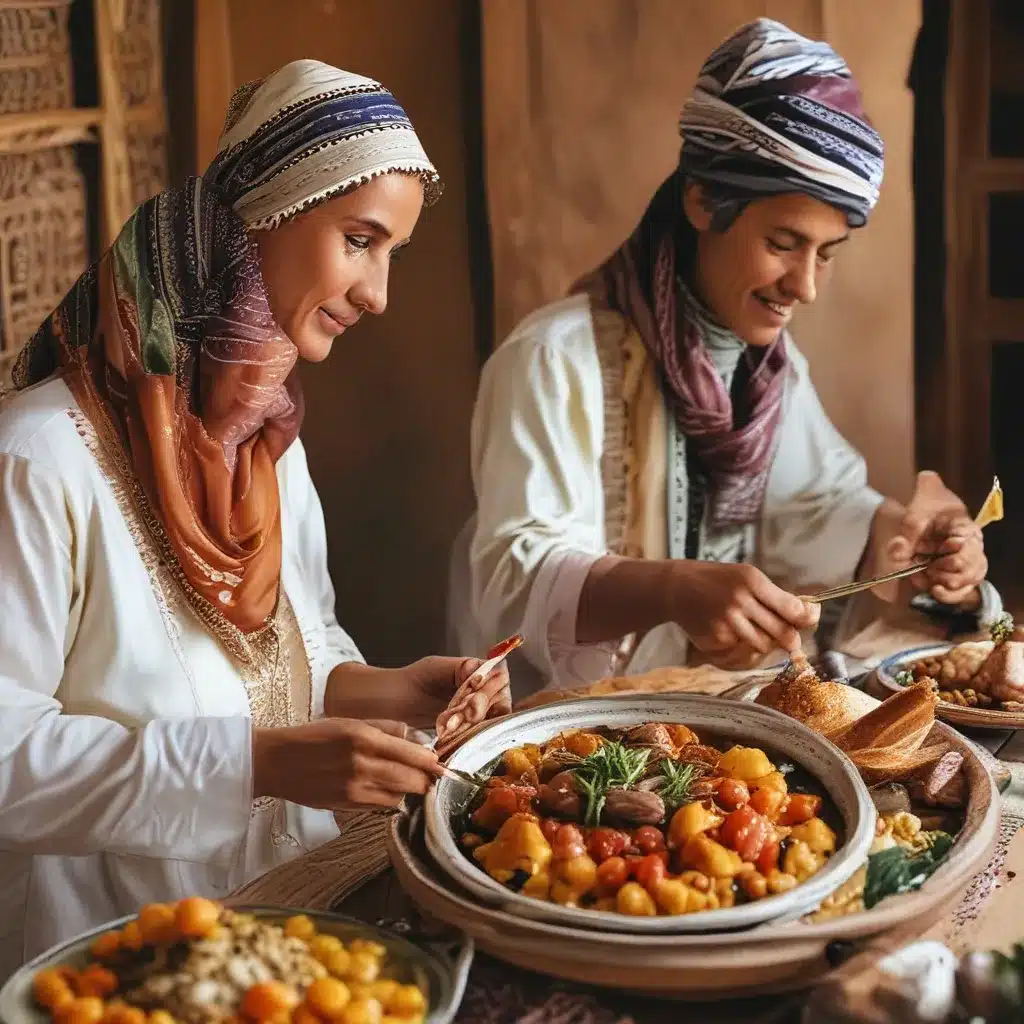
Uncovering the Culinary Soul of Morocco
As I step out onto the bustling streets of New York City, the aroma of spices and sizzling meats wafts through the air, beckoning me to explore the vibrant Moroccan culinary scene. It’s here, amidst the towering skyscrapers, that I find El Bahia, a Moroccan restaurant that promises to transport me on a journey through the rich traditions and flavors of this North African oasis.
Beyond the ornate façade, I’m welcomed by the warm hospitality that is the hallmark of Moroccan culture. The interiors are a harmonious blend of modern elegance and timeless Moroccan charm, with intricate tile work, ornate lanterns, and vibrant textiles that captivate the senses. As I settle into a cozy corner, I can’t help but feel a sense of anticipation, eager to unravel the culinary secrets that lie within.
Embracing the Slow Food Movement
The menu at El Bahia reflects the restaurant’s commitment to the Slow Food movement, a global initiative that celebrates the connection between food, culture, and sustainability. Slow Food encourages travelers to immerse themselves in the rich tapestry of local gastronomic traditions, supporting artisan producers and preserving biodiversity along the way.
As I peruse the menu, I’m struck by the depth of knowledge and passion that the chefs have for their craft. Each dish is a labor of love, crafted with the finest local ingredients and prepared using traditional Moroccan techniques that have been passed down through generations. From the fragrant tagines simmered to perfection to the delicate layers of flaky bastilla, every bite promises to be a revelatory experience.
Uncovering the Flavors of Morocco
One dish that immediately catches my eye is the Moroccan Vegetable Tagine, a vibrant medley of seasonal produce simmered in a fragrant broth infused with Moroccan spices. Tagine, the iconic Moroccan stew, is a testament to the country’s rich culinary heritage, with its unique cone-shaped clay pot allowing the flavors to meld and mingle in perfect harmony.
As I take the first bite, I’m transported to the bustling souks of Marrakech, where the air is thick with the scent of cumin, cinnamon, and ginger. The tender vegetables, cooked to perfection, are a symphony of textures, while the aromatic broth coats my tongue with a depth of flavor that lingers temptingly. It’s a dish that celebrates the bounty of the land and the ingenuity of Moroccan cooks who have mastered the art of slow-cooking.
Next, I’m intrigued by the Chickpea and Spinach Couscous, a hearty and protein-rich dish that showcases the versatility of Moroccan cuisine. The fluffy couscous grains are the perfect canvas for the savory stew, which combines the nutty texture of chickpeas with the fresh, earthy flavors of spinach and tomatoes. The blend of Moroccan spices, including cumin, coriander, and cinnamon, lends a depth of flavor that makes this dish a true delight for the senses.
As I savor each bite, I can’t help but appreciate the care and attention that has gone into crafting these dishes. The chefs at El Bahia have not only mastered the technical aspects of Moroccan cuisine but have also imbued each plate with a sense of cultural heritage and a deep respect for the ingredients.
Connecting with the Land and its People
Beyond the culinary delights, the Slow Food movement at El Bahia also extends to its commitment to sustainability and community engagement. Slow Food strives to build alliances between farmers, restaurateurs, and hospitality providers, maximizing the tourism multiplier effect on local food production and preserving the rich biodiversity that is the foundation of Moroccan cuisine.
I’m intrigued to learn that the restaurant sources many of its ingredients from local farms and artisanal producers, ensuring that the flavors I’m experiencing are a true reflection of the region’s bounty. By supporting these small-scale operations, El Bahia not only delivers an exceptional dining experience but also contributes to the preservation of traditional food-producing practices that are the lifeblood of Moroccan culture.
As I delve deeper into the Slow Food ethos, I’m struck by the restaurant’s dedication to educating its patrons about the importance of food biodiversity and the positive impact that mindful consumption can have on local communities. Through partnerships with organizations like the Slow Food Foundation, El Bahia offers unique insights into the stories behind the dishes, connecting diners with the farmers, cheesemakers, and artisans who are the custodians of Moroccan culinary traditions.
Savoring the Authentic Moroccan Experience
As my meal at El Bahia draws to a close, I find myself reluctant to leave the cozy confines of this Moroccan oasis. The vibrant flavors, the rich cultural heritage, and the palpable sense of community have left an indelible impression on me, and I know that this is just the beginning of my journey into the captivating world of Moroccan cuisine.
With each bite, I’ve savored the essence of Morocco – the fragrant spices, the tender meats, the vibrant produce – all woven together into a tapestry of culinary excellence. But more than that, I’ve gained a deeper appreciation for the Slow Food movement and its ability to connect travelers with the heartbeat of a destination, fostering a genuine understanding and respect for the local culture.
As I step back out onto the bustling streets of New York City, I can’t help but smile, knowing that the flavors of Morocco will linger long after my plate is empty. This is not just a meal, but a transformative experience that has left an indelible mark on my palate and my soul. And I can’t wait to return, to continue my exploration of the Slow Food movement and the rich culinary traditions that make Morocco such a captivating culinary destination.


